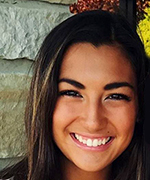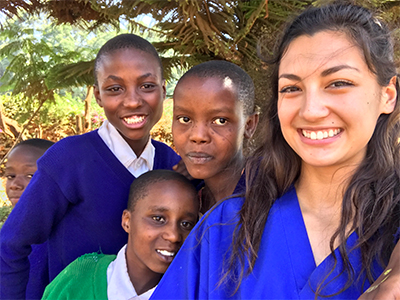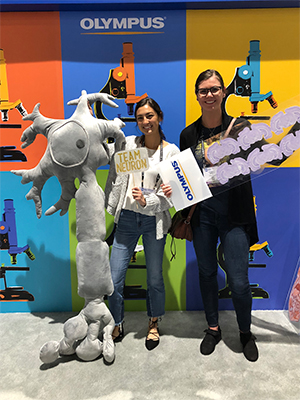
- senior Biology major, with Neuroscience and Premedical Studies co-majors
- minor in Nutrition
- from Cincinnati, OH
- entered Miami via the Bridges Program
- conducted research in the Center for Neuroscience & Behavior, examining the social context of binge drinking (2017 Undergraduate Summer Scholar)
- visited Peru (2016) and Tanzania (2017) with the MedLife student organization
- member of Alpha Phi social sorority and Big Brothers/Big Sisters
"Overall, I'd never thought that doing research would be something that would interest me, but I definitely see it as part of furthering my education. Physicians learn to balance their time. Working in the lab setting has given me the skills to critically think about problems and communicate the results with people."
Why Miami?
"Miami's proximity to my home in Cincinnati and the scholarships it offered were a big draw for me. I first visited as a high school senior on the Bridges Program, which is focused on student diversity, so I got to tour the campus with other students, slept in a dorm, and bonded like we were already a class coming in together.
"After that experience, my parents and I decided Miami would be a good fit — it doesn't feel too small, like you're still in high school, and it provides many opportunities for students to form meaningful, lasting connections with professors. Now my brother is applying to Miami on the Bridges Program too. It's kind of funny to see it come full circle!

Katherine Rodriguez and friends at Machu Picchu, Peru.
"I was homesick during the first few weeks, but I felt I had nothing to lose, so I reached out to many people to make friends. This helped me feel a lot more comfortable here. After my first semester, in January 2016, my friends and I went on a medical mission trip together to Peru with MedLife, and after that experience I felt a lot more comfortable returning to campus for the spring. Knowing I'd created great memories with my friends made me feel really comfortable and excited to come back."
Best Miami Experiences
"I came in as a biology major, but I didn't really know about neuroscience. Once I took my first neuroscience course I really loved it for being the perfect blend of the molecular side of biology and relating that to human behavior and certain kinds of diseases. After doing the MedLife trip, I solidified my passion for a career in the medical field, maybe as a doctor. I talked to my advisor about adding neuroscience as a co-major, and all the classes have been really interesting.
"My research mentor is assistant professor of psychology Matthew McMurray, who came in to talk to one of my biology classes. I went to his office and asked if I could help out that summer in the Center for Neuroscience & Behavior to learn the basics of a behavioral neuroscience lab. After that, I went on to do more independent projects by staying on campus for another full summer as an Undergraduate Summer Scholar.
"Dr. McMurray, associate professor Jennifer Quinn, and assistant professor Anna Radke, all from the behavioral neuroscience lab, have had a big impact on me. Dr. McMurray is always pushing me to apply for more scholarships or research programs and has really given me an opportunity to become a leader in the lab and develop my interests in neuroscience and tailor it to what I specifically want to do.
"Having recently applied to medical school, I feel prepared for post-graduation through my Miami coursework and preparation for the MCAT exam. My premedical classes showed me what the application process was going to look like, so I never felt I was going through it alone. I definitely feel as prepared as someone can be for starting the entire medical school process! Although I'm not sure what kind of doctor I want to be yet, I'm really interested in neonatology or pediatric oncology. I'd also like to continue doing neuroscience or neurology research in medical school after I've done more shadowing with specialists in those fields."
Miami and the Liberal Arts

Katherine Rodriguez with some Tanzanian children.
"Through my science courses, I've been learning specific skills and methods to be used in a medical career. But in many of my other classes, such as sociology and English, I've also been learning how to relate to people. It's really important to take a variety of courses to help form you into a holistic person who can communicate with people, not just spit out facts.
"In high school, I liked learning how things work, particularly how tiny molecular organisms in the body play a role in diseases. This interest naturally led me to my biology major, but I added my neuroscience co-major because I also loved psychology, and I'm really excited to see how psychology also relates to diseases such as depression and Alzheimer's. Understanding the psychological and physiological effects of disease feels more relatable to real problems in the world than just biology by itself.
"My favorite courses have included Introduction to Advanced Biopsychology [PSY 251/351], which I became a TA for. I've also really enjoyed my intro level nutrition class, KNH 104, which is basically a cooking class where we get to make stuff and try everyone's cooking. The course was focused on the safety of nutritious food preparation, and it was a lot of fun."
Analyzing the Effects of Social Binge Drinking
"I first became involved in Dr. McMurray's research lab after working with him over the summer between my freshman and sophomore years. He encouraged me to apply for the Undergraduate Summer Scholars program for summer 2017, which enabled me to develop my own project focused on the social contexts of binge drinking in adolescents. We see binge drinking everyday here at Miami and across the US — whether you choose to drink with your friends at a party or if you drink alone in your dorm room, your choices are going to affect your preferences for alcohol later in life, which could lead to anxiety or other problems.
"My research relies on rat models of human behavior. We allow rats to consume alcohol, just like humans, but by using rats, we can control for a lot of the complex biological and social factors that humans experience. We study the social factors that contribute to drinking across the rats' entire life spans —adolescence through adulthood.

Katherine Rodriguez (left) and a colleague at the 2018 Society for Neuroscience Conference.
"Although my research is not directly translatable to human behavior, I'm able to make connections to humans, related to drinking preferences and prevention strategies. The study helps me identify the various risk factors of drinking with friends or drinking alone. By knowing these risk factors and their connections to drinking behavior in rats, I can make certain predictions on how such behaviors may affect humans socially and biologically later in life.
"We use special tests and methods to test the rats' drinking preferences. Do they like drinking alcohol just because it improves their social interactions, or do they just really like being physiologically drunk? We observe their preferences based on both alcohol and social rewards, which reveal their underlying motivation for why they seek out alcohol. We also find that some rats are more likely to build tolerance and become addicted in adulthood, depending on the social context in which they drink.
"The faculty in the lab encouraged me to branch into doing other kinds of research, so I gained the confidence to apply for other summer internships, such as one I completed in summer 2018 at Cincinnati Children's Hospital. There, I shadowed a physician and learned how physicians conduct clinical research, which is something I'd likely wish to continue while also seeing patients.
"Overall, I'd never thought that doing research would be something that would interest me, but I definitely see it as part of furthering my education. Physicians learn to balance their time. Working in the lab setting has given me the skills to critically think about problems and communicate the results with people."
Advice to Students
"Get involved with different kinds of activities and experiences early and put yourself out there. You never know how powerful networking can be, so email as many faculty as you can to get involved with research and internship opportunities.
Also, it's important to find time to relax and try not to stress too much. I spent a lot of time during my freshman year stressing out about coursework and other things, but I later realized that everything tends to work out in the end. You just need to take time to think about your wellbeing and mental health — there's no need to stress about school!"
[January 2019]
 Miami University Oxford, Ohio est. 1809
College of Arts and Science
Miami University Oxford, Ohio est. 1809
College of Arts and Science
 Miami University Oxford, Ohio est. 1809
College of Arts and Science
Miami University Oxford, Ohio est. 1809
College of Arts and Science